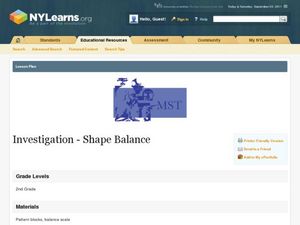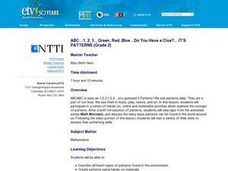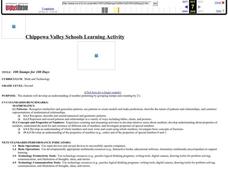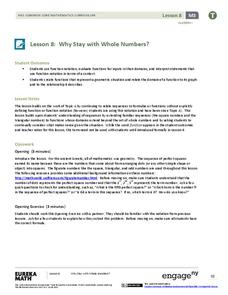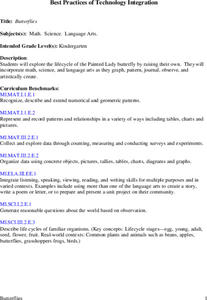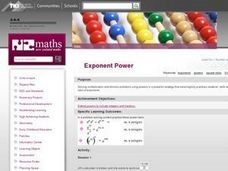Curated OER
Seeing is Believing - Or Is It?
Here is a great science lesson. It extends the concept of vision into the area of optical illusions, perspective, and tessellation. This well-designed plan has tons of great activities, utilizes interesting video, and should lead to a...
Inside Mathematics
Two Solutions
Many problems in life have more than one possible solution, and the same is true for advanced mathematics. Scholars solve seven problems that all have at least two solutions. Then three higher-level thinking questions challenge them to...
Curated OER
The Clumsy Tiler N (Metric)
Students explore patterns and geometric sequencing. Students devise and use problem solving strategies to explore situations mathematically. Students solve real life problems. They demonstrate, with cardboard pieces, fraction and...
Curated OER
Investigation: Shape Balance
Second graders explore geometry by utilizing pattern blocks. In this shape identification lesson, 2nd graders view the characteristics for several different geometric shapes and create them using building blocks and other classroom...
Curated OER
Problem Solving Using Power Polygons
Students investigate geometric shapes by creating figures on a plane. In this polygon lesson plan, students complete a worksheet based on the angles in a power polygon. Students identify the different types of polygons and define their...
Curated OER
Investigation - Looking For Triangles
Seventh graders investigate a series of triangles, looking for patterns and generalizing what they have found. They analyze the pattern data and organize it into a table and graph. Students identify the relationship and discover the rule...
Curated OER
Fabulous Fractals
Students view a video to discover how patterns in nature relate to math. They explore the concept of exponential growth by observing and creating fractals. They solve and design word problems.
Curated OER
ABC...1, 2, 3...Green, Red, Blue...Do You Have a Clue?... IT'S PATTERNS
Second graders view clips from the animated series Math Monsters, and discuss the many ways patterns can be found in the world around us. Following the video portion of the lesson, 2nd graders visit a variety of Web sites to assess their...
Curated OER
Geometric Figures
Students identify two and three dimensional shapes and use appropriate geometric vocabulary to write a description of the figure by taking pictures of geometric figures in their own environment.
Curated OER
100 Stamps for 100 Days
Second graders count by 2's to get to 100. In this counting lesson plan, 2nd graders use the program Kid Pix to create stamps two at a time until they get to 100.
Curated OER
Sort It Out and Match It Up
Students identify objects that are the same shape and size. They compare and contrast attributes of two-and three-dimensional objects using appropriate vocabulary. Pupils justify an extension of a geometric pattern to explain what was...
Curated OER
ExplorA-Pond:3rd Grade Shapes & Fractions
Learners, using a map, drawing or aerial view of a pond, represent the shape of the pond using simple geometric shapes or fractions of those shapes. They identify the numerator and denominator in each fraction created.
Curated OER
Turn Symmetry
Fourth graders observe geometric patterns to determine if they show rotational or point symmetry. They participate in the a demonstration lesson with a triangle. They create their own designs that show rotational or point symmetry.
EngageNY
Why Stay with Whole Numbers?
Domain can be a tricky topic, especially when you relate it to context, but here is a lesson that provides concrete examples of discrete situations and those that are continuous. It also addresses where the input values should begin and...
Curated OER
Tessellations
Students identify and construct figures that tessellate. They investigate which regular polygons tessellate and how to modify them to make other tessellating figures. Students explore how naturally occurring tessellations have been...
Curated OER
African Mask
Students make masks. In this African art lesson, students review background information about African art and the use of masks. Students use geometric shapes and other designs to create their masks.
NOAA
To Explore Strange New Worlds
It's time to boldly go where your class has not gone before! The introductory lesson in a five-part series takes young oceanographers aboard the NOAA Ship Okeanos to begin a study of ocean exploration. The lesson includes a comparison of...
Curated OER
The Function Box
Students explore arithmetic and numerical patterns. After observing a teacher created function box, students describe a pattern and predict what will "come out" of the function box. They explore patterns such as geometric shapes,...
Curated OER
Twenty Green Gates
Second graders explore mathematics by participating in a pattern building activity. In this geometric construction lesson, 2nd graders discuss a story problem in which a gate needs to be built from triangles and trapezoids up to a...
Curated OER
Butterflies
Students will explore the life cycle of the Painted Lady butterfly by raising their own. They will incorporate math, science, and language arts as they graph, pattern, journal, observe, and artistically create.
Curated OER
A Picture's Worth
Fifth graders explore the concept of fractions. Through hands-on activities, student pairs work to create various forms of fractions. Using geometric drawings and manipulatives, they demonstrate equivalent fractions, improper...
Curated OER
Exponent Power
Learners explore multiplication and division problems using exponents. Students examine positive, negative and zero powers. They relate powers to geometric sequences. Learners devise strategies and discover rules of exponents.
Curated OER
Chessboard Challenge
Second graders read "The King's Chessboard" by David Birch. The teacher reads the story aloud and pauses at several points for students to calculate the next number in a pattern of doubling.
Curated OER
Compatible numbers to 20
Learners practice theories dealing with equals sign used as a balance, inequality symbols and practice utilizing a box or some other geometric shape to represent an unknown number. They assess numeracy problems embedded in language-rick...





